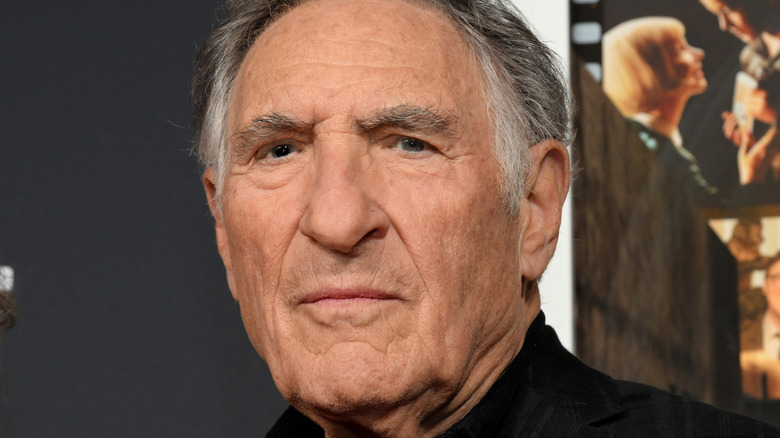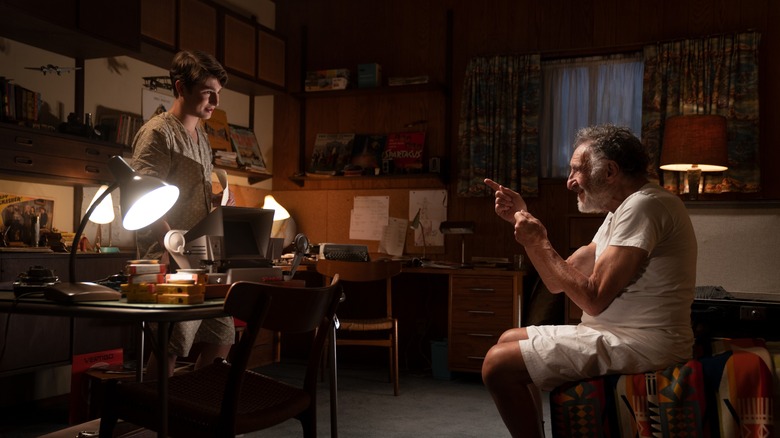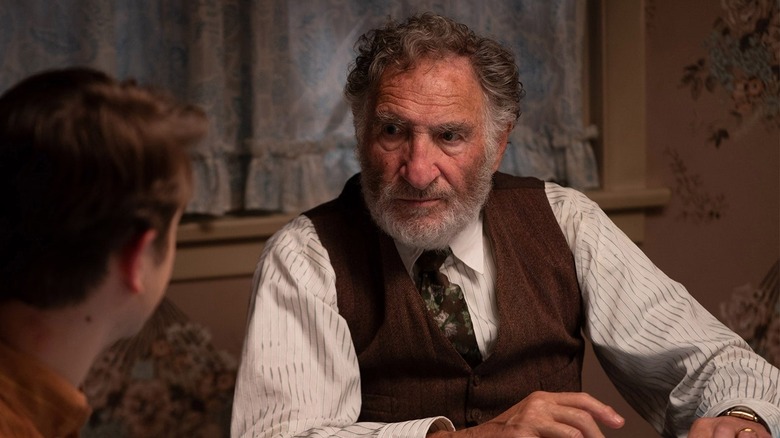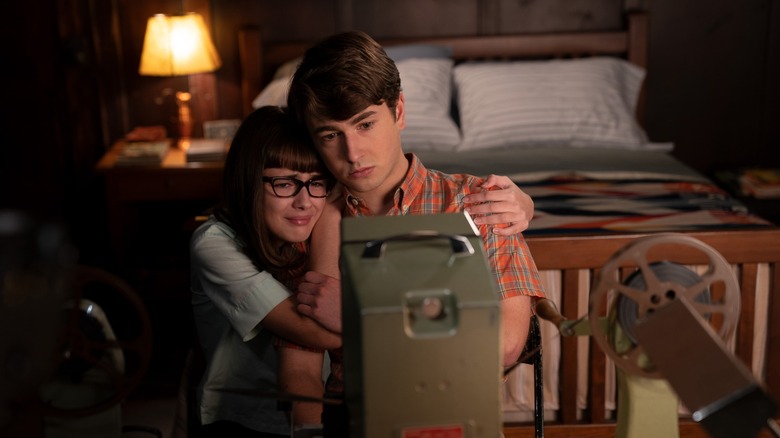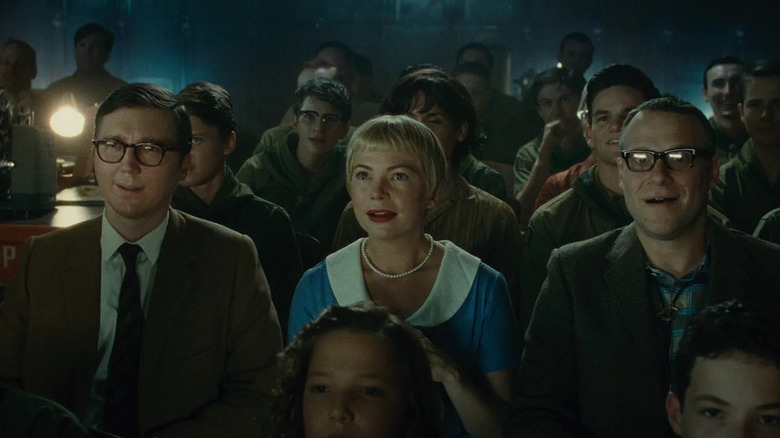Judd Hirsch Talks Working With Steven Spielberg On The Fabelmans - Exclusive Interview
"The Fabelmans" is Steven Spielberg's long-awaited chronicle of his own childhood, growing up loving films and learning to make films while his parents inched their way toward divorce. Spielberg and his co-writer Tony Kushner are quick to point out that the film is a very fictionalized version of Spielberg's younger years — there's a reason the movie isn't entitled "The Spielbergs," after all — but there's enough truth in it to make it the director's most personal feature yet.
Actor Judd Hirsch has had a career that's lasted just about as long as Spielberg's, and yet the two have never collaborated until "The Fabelmans." Thankfully, the team-up was worth the wait, as Hirsch portrays Boris Schildkraut, the great-uncle of Spielberg analog Sammy Fabelman (Gabriel LaBelle). Hirsch is mesmerizing in the part, playing a man who devoted his life to the arts and inspires young Sammy to do the same in turn. Boris is a character who is alternatively warm, hilarious, and menacing, a hat trick that the 87-year-old Hirsch pulls off with aplomb.
During an exclusive interview with Looper, Hirsch explained how he was able to find such a character and described how working with Spielberg and LaBelle meant that giving his performance ended up feeling effortless to him.
Finding Boris' voice
Your character plays such a pivotal role for young Sammy. Can you talk about who you might have based Boris on in real life?
A lot of people. It's pieces of humorous folks, Yiddish guys, Russian guys, people that passed me by and that I tried to do stuff about.
I was in a play where I was going to play an 81-year-old, and I was only 50, and he comes from Estonia. You don't know. There was a certain kind of sound that made me the character, so I had to do it. I wanted to do it very much — I wanted to get the right guy because it's a very funny piece. It was called "I'm Not Rappaport." The guy was an old Jewish guy sitting on a bench with a Black guy in Central Park. To bring back everything that he was, you had to do the kind of person he was. You could choose anything you wanted, but you got to get the right one.
I remember I was doing something where he sounded a little light [and] natty. Then I was looking at the author [Herb Gardner], and I said, "He's not that way, is he?" He said, "No." I said, "Well, what more?" He said, "Bigger than that." I changed my entire voice to a guy who was the commander: He's right all the time. It's almost like you should know that every time he opens his mouth he's right. He can't be a guy who says, "You know what I mean?" He's got to be a guy who says, "You know what I mean." Different person.
'You didn't think I was a monster when we did that scene?'
There was this intriguing and surprising element of spookiness to Uncle Boris, especially beginning with Mitzi's premonition of his arrival.
"Don't let him in."
During your big scene with Sammy, there are these interesting nuances of tone and unpredictability. How did you modulate your performance?
You're going to have to ask the kid that played Sammy, Gabriel LaBelle. I'd love to know what [he thought]. When we started, we didn't have rehearsal. We didn't even all of a sudden rehearse a bunch of stuff and come back the next day and do it, or come back the same day and do it. We just did it.
I think Steven [Spielberg] wanted him to be extremely surprised and know how to handle it — give him an actor's problem. "What are you going to do if he does that?" I don't know; you'd have to ask Steven. But when I found out from the kid later on ... I told him, when I finally saw the entire movie, what a wonderful choice he is to play this part. I said, "You didn't think I was a monster when we did that scene?" He went like, "No, no!" [sigh of relief] "Thank you."
[Boris] could be [a monster]. He could. You don't think of tastefulness or tastelessness to do it, because it's written and you got to say those words. Tastefulness and tastelessness is your attitude about it. If your attitude is "I'm doing this for your sake" instead of "You better do this because I said so" ... There's a big difference between the two. You got to wonder — how are you going to do that message with those words? That puts a damper on the performance. I'm always wondering, "How's it going to turn out?"
'The atmosphere is that there is an elephant in the room'
It's fascinating that you didn't do any rehearsal, given the verbosity of the script, co-written by the playwright Tony Kushner.
[Steven Spielberg] was already working with Gabriel [LaBelle] before I got there. They had already done ... a bunch of stuff before I ever got there. They were shooting all out of [sequence on] the movie. I don't know. I had no idea who the kid was, or what we were going to be like and what he meant in our scene, or how it was going to affect him. I said, "Okay, well, you're in the movie. You know who you are, and Steven will do the rest."
Was there strict blocking on the set?
No, not at all. "What's comfortable, to go there?" But even that wouldn't make any difference. You push me around, it's fine. It seemed like that — push me around. Why not? There's an energy in that. I'm not going to say, "Can I sit here and do this whole thing?" No, no — active. You want to create the atmosphere, and the atmosphere is that there is an elephant in the room. That was up to him.
The genius about Steven is he already knows what the camera's doing before he does it. He knows exactly what the shot looks like. He should by now, right? If you didn't know he was going to shoot your teeth only, it wouldn't make any difference. He would know.
Bitten by the acting bug
Boris has a lot to say to Sammy about the way having the artist bug can take over your life. You've had such a long career; how did you make the choice to stick with it? When did you get bitten by "the bug"?
The bug hit me later when I realized there was nothing else. Everything else that looked successful — learning, college, studying, applying, working as [whatever] — was uninteresting. The question was, "What is interesting?" and the answer was, "I'm going to need a psychologist for this, folks, because I don't know how to make myself happy. I really don't. Other people are going to have to be involved."
You have to know other people. You have to want to be with a bunch of other people. You have to want to have relationships of some sort. I went, "We had fun in school. Why? Because I was with all the kids. Where do you do that? In the theater."
"The Fabelmans" is in select theaters now and opens everywhere on Thanksgiving.
This interview has been edited for clarity.
